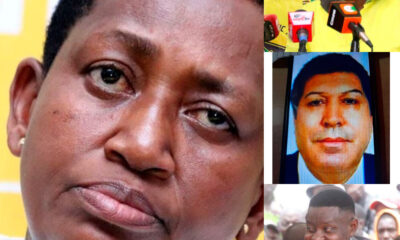Africa
Hormuud Telecom Clashes with Somali Government Over Starlink License in Bitter Dispute

A brewing conflict between Somalia’s telecom giant Hormuud and the Somali federal government has erupted into a public feud, with Hormuud accusing the administration of President Hassan Sheikh Mohamud of undermining a homegrown business by granting an operational license to Elon Musk’s Starlink without adequate consultation. Industry insiders reveal that the dispute could have far-reaching implications for Somalia’s telecom sector, its economy, and the political landscape.
Hormuud, Somalia’s largest telecom provider and a near-monopoly in the industry, operates critical infrastructure, including a submarine cable system in the Horn of Africa. The company, which employs thousands and is the country’s biggest private employer, is reportedly incensed by the government’s decision to greenlight Starlink’s satellite internet service. Sources close to the matter claim Hormuud views the move as a betrayal, with one insider stating, “The HSM government is stabbing an indigenous Somali-owned business in the back.”
The controversy centers on the National Communications Authority’s (NCA) announcement on April 13, 2025, granting Starlink a license to operate in Somalia, a move hailed by government officials as a step toward bridging the digital divide. At a ceremony in Mogadishu, NCA Director General Mustafa Yasin Sheik emphasized the potential for Starlink’s low-Earth orbit satellite network to deliver high-speed internet to remote and underserved regions. “Starlink’s entry into Somalia represents a significant milestone in our efforts to bridge the digital divide in our country,” Yasin said. Minister of Communications and Technology Mohamed Mo’allim echoed this sentiment, affirming the government’s commitment to “affordable and accessible internet services for all Somalis.”
However, Hormuud, led by influential tycoon Sheikh Ali Ahmed Nur Jim’ale, who now resides in Djibouti, alleges that the government bypassed proper consultation with the telecom sector. The company, which operates in both government- and Al-Shabaab-controlled territories and contributes significant regulatory fees to state coffers, sees Starlink’s entry as a direct threat to its dominance. “Somalia’s President Hassan Sheikh has signed the demise of his political career. You cannot break Somalia’s most powerful telecom monopoly and not pay a hefty price,” a source close to Hormuud warned.
Hormuud’s near-monopoly has long been a point of contention. Critics argue that its dominance stifles competition, resulting in high data costs and limited coverage, particularly in rural areas where only 27.6% of Somalis have internet access as of 2024. Detractors, including industry analysts, have called for liberalization of the telecom sector, asserting that increased competition could lead to lower prices, better speeds, and wider coverage. “Hormuud’s monopoly has many detractors who say it is time for Somalia to liberalize the telecom sector, and in the end, the ordinary consumer would benefit,” noted a prominent Somali analyst on X.
Starlink’s arrival is seen as a potential game-changer for Somalia, where poor terrestrial infrastructure has left many communities disconnected despite the presence of undersea cables like EASSy and DARE1. With its satellite-based service, Starlink promises to deliver low-latency, high-speed internet to even the most remote regions, potentially reshaping access to education, healthcare, and commerce. However, concerns remain about affordability, as Starlink’s pricing may be prohibitive for many Somalis without government subsidies, a model the company has employed in other regions but has yet to confirm for Somalia.
The dispute has also taken on a darker tone, with some voices on X alleging Hormuud’s ties to Al-Shabaab, claiming the company’s operations in militant-controlled areas and its control over internet, remittance, and media sectors make it a security risk. One post suggested that Starlink’s entry could serve as a “security strategy” to counter Hormuud’s influence and track terrorist activities, though these claims remain unverified. Hormuud has faced similar accusations in the past, with UN reports linking it to Al-Shabaab extortion schemes, but the company has consistently denied such allegations.
As the standoff unfolds, the Somali government faces a delicate balancing act: fostering competition and digital inclusion while navigating the economic and political clout of Hormuud, a company deeply embedded in the nation’s fabric. For now, the entry of Starlink signals a new chapter in Somalia’s telecom landscape, but whether it will deliver on its promise of connectivity or ignite further conflict remains to be seen.
Kenya Insights allows guest blogging, if you want to be published on Kenya’s most authoritative and accurate blog, have an expose, news TIPS, story angles, human interest stories, drop us an email on [email protected] or via Telegram
-

 News2 weeks ago
News2 weeks agoTHE FIRM IN THE DOCK: How Kaplan and Stratton Became the Most Scrutinised Law Firm in Kenya
-

 Economy2 weeks ago
Economy2 weeks agoIran Demands Arrest, Prosecution Of Kenya’s Cup of Joe Director Director Over Sh2.6 Billion Tea Fraud
-

 Grapevine1 week ago
Grapevine1 week agoA UN Director Based in Nairobi Was Deep in an Intimate Friendship With Epstein — He Even Sent Her a Sex Toy
-

 Business2 weeks ago
Business2 weeks agoKPC IPO Set To Flop Ahead Of Deadline, Here’s The Experts’ Take
-

 Politics2 weeks ago
Politics2 weeks agoPresident Ruto and Uhuru Reportedly Gets In A Heated Argument In A Closed-Door Meeting With Ethiopian PM Abiy Ahmed
-

 Investigations1 week ago
Investigations1 week agoHow Mexico Drug Lord’s Girlfriend Gave Him Away
-

 Business2 weeks ago
Business2 weeks agoSafaricom Faces Avalanche of Lawsuits Over Data Privacy as Acquitted Student Demands Sh200mn Compensation in 48 Hours
-

 Investigations1 week ago
Investigations1 week agoHow Close Ruto Allies Make Billions From Affordable Housing Deals

















